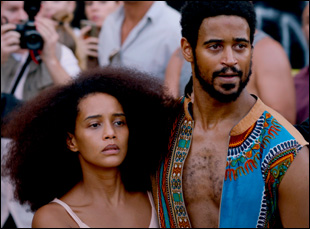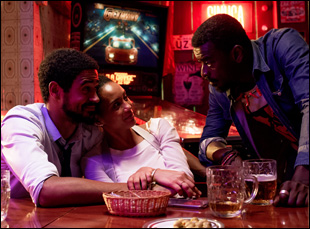After a longtime career as an actor, Lázaro Ramos was determined in his directorial debut “Executive Order” to extend to his cast what his favorite collaborators had given to him on their films — a feeling of ownership.
“Three years ago to this day, I finished my 38th movie [as an actor],” Ramos told me, with the help of a translator, a week ago from his home in Brazil. “And sometimes I feel the director feels the movies are made just with him. But I really believe we make a movie with a team. Each contribution is important.”
It wasn’t only the ethos on set, but a theme inherent to “Executive Order,” which imagines a not-so-distant future where the advent of removing melatonin from the skin promises a society in which ideally racism will no longer be an issue, but between a botched rollout of the treatment as well as pushback against a demand from attorneys of the High-Melatonin Association for reparations, the plan backfires with a movement to push those of color to self-deport to the countries of their ancestors. With gentle sci-fi touches, Ramos uses the wild premise to observe the absurdity of attempting to exclude any one culture from a society that’s been built together, though “Executive Order” brings to light all the ways in which it has happened historically and how minorities are often asked to hide their roots, as its central couple Antonio (Alfred Enoch) and Capitu (Taís Araújo) take shelter in a bunker that at one time was a slave depository that was subsequently used to store costumes and props for Carnival when the event was illegal.
“In a culture of death, living is a civil disobedience,” someone can be heard saying amidst the chaos that ensues in “Executive Order,” and Ramos brings clarity in reminding that the greatest societal change is often made only after there is the strongest resistance to it. Inspired by the success of a play (“The Mountaintop”) he directed for a local theater group as its one-month run extended to five years, Ramos could see how an idea that started small could galvanize a movement and after supervising a climax that involved hundreds on the streets of Brazil, he has channeled that energy into something bound to be much larger. A year removed from its originally scheduled premiere at SXSW, “Executive Order” feels even more timely now than it would’ve been before the coronavirus delayed its debut and certainly Ramos’ enthusiasm for the film hasn’t flagged in the least, marveling at how everyone united to create something greater than the sum of its parts.

Because I’m crazy. [laughs] This is something really difficult to know. I directed this play in 2011 and it was hugely successful. The play [inspired] very important discussions from the audience and I started to show this to friends and filmmakers and [ultimately] I decided to direct because we talk many, many times about racism, identity, and social exclusion, but I feel this way to talk about this subject is different. I don’t want to talk just with the people that think the same as me and I felt mixing comedy/thriller/drama can bring other people for this discussion.
It is really special because it was an incredible opportunity to try to discover my language on cinema because we had many good filmmakers here in Brazil and as an actor, I wanted to work with those people. I’ve directed TV and theater, but I thought if I’m going to the cinema, I need to discover my language. So it’s the start of a kind of research. I want to direct other movies and this first one was my university.
This hardly looks like a student film, and I was surprised to learn this originated on the stage because of the scale of it. What was it like to build the world of this?
Yeah, it’s huge. I had a really special crew – many important professionals from the movies here [in Brazil] – Adrian Teijido, the cinematographer and Tiago Marques [Teixeira], the art director, and I tried to research about the Afrofuturist language. It was not possible to put all the things that I wanted. But there are many symbolic things [throughout] this movie. The music is [also] something special. We have Elsa Soares, one of the most important Black singers in Brazil, and Rincon Sapienza, an amazing rapper.

A lot, because I wanted that ancestral heart in this movie. What bothers me as an artist is the idea to talk about racism in one specific way. It’s an issue that we feel so much pain about and especially for me, it’s difficult to think about the solution just one way, so the choices that I’ve made during this film were to engage people to talk about this and the bunker is the biggest symbol of this desire because I can say that is the Black history worldwide. It was a way to put in a very special place the Black contribution to culture and science and all the others.
Not that the subject of race has been less important, but over the seven years of developing it, it seems like there’s greater attention paid to it. Did your ideas evolve over the years?
It changed every day. [laughs] I think we need to look around us, look to the world and the desire to change the world for the better is important, but what I tried to put in the movie is that it’s something philosophical. That’s why I want the people to laugh and to cry at the movie, and why there are some melodramatic things in it because I think [there’s a] responsibility to feel that’s the most important thing about the problems around the world. Sometimes we [start looking at] problems as something normal and we [don’t see how] to change the world.

It was a really special [day] because we had 250 extras, and I put [posts] on some friends’ website groups talking about this scene and I [said], “If you want, you can [come] for the last scene. [And from those] friends many other friends started to appear and this scene has many important writers, journalists, actors and friends from Brazil who felt they needed to be in this scene. It was really special. I cried because the people appear and it [felt] really important. We have on this scene Conceição Evaristo, one of the most important writers from Brazil who is almost 80 years old and she told me on this day, “My son, I’m really happy with this movie and it’s really important to walk with those people here in this scene.”
What was it like finding out you got into SXSW?
I’m really excited. Last year was a very sad year because we were [set] for SXSW 2020, and I’m almost at the airport going to Texas and the corona stopped us. You know I cry — I’m a person who cries, but now I’m really happy because I feel this is the right place to put our movie. When I saw Jordan Peele with “Us” many years ago, I thought wow, this is the special festival for this movie because we have a special language. The discussions are important for the kind of cinema that I want to make and now I feel it’s an honor to start our steps here.
“Executive Order” will screen at SXSW on March 16th at noon CST. There will be a livechat with Lázaro Ramos on March 18th at 3 pm PST/5 pm CST/6 pm EST.




